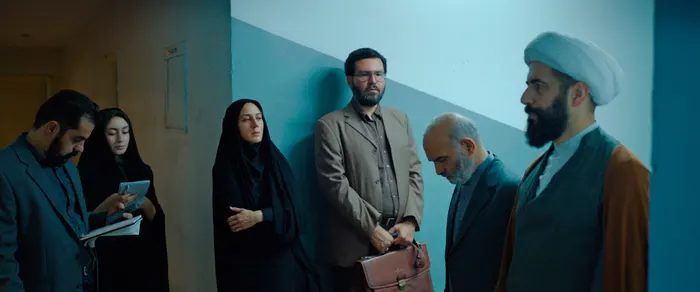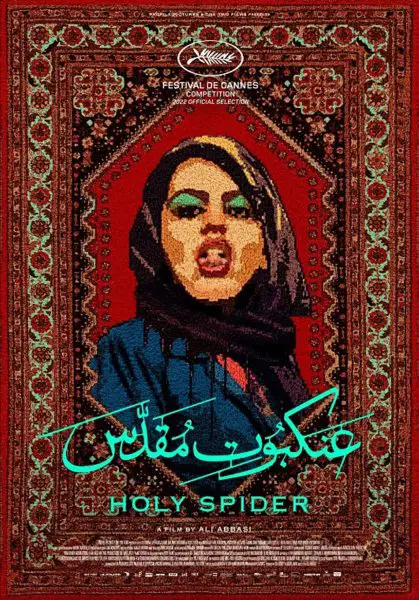Houston Cinema Arts Festival: ‘Holy Spider’ Review

The following is part of our coverage of the Houston Cinema Arts Festival.
During a long period between 2000-2001 in Tehran, Iran, sixteen women fell victim to a sadistic serial killer. Because these women were sex workers, the public turned a blind eye, proclaiming that these cold-blooded murders were acts of God to cleanse the streets. When the killer, Saeed Hanai, was finally caught, his actions had ardent defenders. In a time when women in Iran are still fighting tooth and nail for their rights, this story feels all too relevant. How fitting, then, that Holy Spider is here to tell that story to audiences of today.
READ: Full Circle Flashback: ‘Starship Troopers’ Review: “25 Years of Sci-Fi Greatness”
Iranian-born Danish filmmaker Ali Abbasi might be familiar to fans of his festival darling Border from 2018. Whereas that film dabbled in magical realism, Holy Spider gains recognition for its unflinching look at a very serious subject. And unflinching it is, although it takes a while for its two disparate core storylines to come together. The first storyline involves journalist Rahimi (Zar Amir Ebrahimi), who arrives in Tehran to investigate the so-called “Spider Killer”. Ebrahimi is a commanding presence, her steely commitment giving Rahimi the headstrong resolve of a gumshoe detective.
Of course, she’s only a journalist, and a fictional one at that. Rahimi exists for the audience to experience aggressions both micro and macro that women in Iran encounter from the dominant men and complicit women. It’s with great relief that Abbasi and co-screenwriter Afshin Kamran Bahrami don’t reduce her to a simple object of oppression. Rather, the film portrays her as an advocate for those whose deaths the public treats with a telling indifference. Best of all, it avoids the pitfalls of true crime media by putting the reason behind the mission above all. Cutting through the red tape to get real justice, not just to break a career-launching story. Rahimi is the type of protagonist you can rally behind wholeheartedly because of her determination to do what’s right.
The other aspect of the film, focusing on the POV of the killer, might cause a bit more debate. Unquestionably, there are some surface-level aspects to the portrayal of Saeed Hanai (Mehdi Bajestani) that initially give pause. Given the gritty cinematography by Nadim Carlsen, often adorned by the salacious glow of saturated reds, portraying his first few kills of the film in a stylish manner, there’s a worry that poor taste will take over in the name of artistic flair. The synth-based score courtesy of Martin Dirkov, accompanying scenes of Saeed scouring the nights for victims on his motorcycle, certainly gives pause. Nevertheless, Abbasi proves this wrong, by drawing upon the raw power of Medhi Bajestani as a performer.
It would be so simple to portray Saeed as the typical “loving” father by day, hateful killer by night. Bajestani and Abbasi don’t allow this, instead opting for something more complicated. Saeed doesn’t act the same way on any of his kills. Sometimes he’s dead-eyed, sometimes his actions horrify him, nor is he always a good family man, sometimes prone to extreme aggression. His constant through-line is the compulsion to kill, the results of which get sloppier and sloppier the more the bodies pile up. More critically, it doesn’t attract any attention, as Tehran society turns a blind eye to these murders because the people who died “deserved” it. He’s a man infected by something – be it mental illness or his own deeply misguided vision. It’s an infection he shares with all too much of the city.
READ: ‘Atlanta’ Season 4, Episode 10 Recap/Review
Inevitably Saeed and Rahimi must collide. When they do, a pulse-pounding climax ensues, the killer is behind bars, and the film ends. Only, it doesn’t. The third act of Holy Spider takes a hard pivot away from what came before. Yet, this pivot also feels like a natural extension of the film’s themes. By going in on the court proceedings, Holy Spider explores just how far a society that sees women as subservient to men and morality as a tiny box will go to protect their way of life. Ending on a stomach-churning note sure to enrage those unaware of the story before, Holy Spider makes its statement loud and clear. As skillfully made as it is painfully relevant, Ali Abbasi’s film is a shining example of how to tell true crime stories with sensitive subject matter. –James Preston Poole
Rating: 8/10
Holy Spider is set to be released by Utopia in the United States. MUBI will handle international release.





